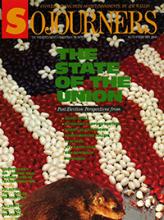"Look at the people," whispered a friend. "Most of them are crying." We were peering down over the balcony rail of the Moscow Baptist Church. This was a Thursday night service, but the sanctuary was full, the balcony jammed, and worshipers had spilled out into the foyer. The quiet tears were noticeable as the people were praying. A very tangible power and presence filled the place.
I was visiting the Soviet Union with a small group of journalists from the United States. Ten days of dialogue with Soviet dissidents had been arranged to discuss the reality and future of the changes taking place in their country. The Americans were all from "dissident" publications as well, and it was thought that we might have some things in common.
What we found was a virtual cornucopia of new political groups and initiatives all born under glasnost and perestroika. Out of the frozen ground of Soviet society, new and still-fragile shoots of cultural and political life are breaking through to herald what all those involved fervently hope will be a Russian spring.
Each day in Moscow, we had almost non-stop conversations with a wide range of people and groups having a great variety of experiences and perspectives. While they seem to run the entire ideological spectrum, they all appear to want the same thing--a more democratic, pluralistic, and open political system and society. Most seem tolerant of each other and even supportive of the different opinions and roles among them.
"That's what democracy means," they would tell us. The groups have names like Civic Dignity, The Club of Social Initiative, Democratic Perestroika, Democratic Union, Moscow Popular Front, Obschina (Community), Glasnost magazine, The Trust Group, and more.
Read the Full Article

